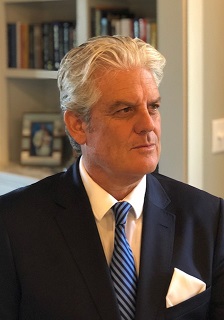From the CEO – February 2020

Dear Clients,
With the world’s attention on the spread of the coronavirus and its impact on the world’s equity markets, investor confidence, and ultimately on the state of the global economy, it’s necessary to mention only a couple of items. One is largely temporal; the other relates to the way in which the virus – and the manner in which has conditioned our responses – will likely impact geopolitical risk in the future.
On the temporal issue, the spread of the virus reminds me unavoidably of Albert Camus’ novel, La Peste (The Plague). I recall reading this piece during an incredibly hot, dry and almost windless summer in Toronto in the early 1990s. The backdrop presented itself as an appropriate one to the novel since smog consumed the air (a yellow cloud over the city is the best description), and the oppressive heat made all generally listless, reluctant to venture outdoors much at all.
Clearly, the comparison to what’s happening today is trite: Hospitalizations were relatively few; relief could be sought quite easily. But it is the interpretations of the book that are significant to current events.
To be sure, perspectives on underlying themes are many. But the one that struck a chord in me referred to Camus’ belief in the value of optimism in times of heightened worry. In the novel, those that chose to battle the plague realized their efforts would expose them to the virus. Yet they also knew that they could pick up the disease if they did nothing. Typically, Camus, the choice was almost meaningless since either result would be unpleasant. However, what wasn’t insignificant was that each character made a choice to act for themselves and, by extension, their community. It was an act of rebellion and something with which one can define one as an individual, part of the collective.
We are told that a response from central banks is forthcoming. That lower rates will offer the business and financial community a measure of solace, a backstop of sorts. Perhaps. But central banks are designed to help with market failures, to boost to economic activity. What we have at the moment is something a little different: a supply issue, a ‘sudden stop,’ as Mohamed El-Erian put it so well this morning. To this, it appears that only an easing in the spread of the virus and/or a vaccine/treatment will right things.
It also suggests a new (or a return of an older one) path is likely for geopolitical risk, where the process of ‘de-globalization’ that we have been talking about for some time picks up speed and congeals around a business consensus. A world not of open borders and free movement of people as such, but one where more attention paid to defined spheres of influence, regulations, and endogenous risks. This really is the genesis of political risk; the stuff that mattered to traders and investors prior to the last wave of globalization that began arguably in the 19th century when transport costs became sufficiently low that they allowed the prices of commodities and other tradable goods between Europe and Asia to unite.
Turing to our ratings this month, Colombia is bordering on the ‘high’ political risk category after an increase in the incidents of terrorist attacks by the traditional groups this month have undermined the public confidence and the government’s popularity.
In Western Europe, France’s Macron has an approval rating of about 30%. Strike activity has eased somewhat and the jobless rate is at a decade low. In Italy, the coronavirus outbreak, confined as it is largely in the northern areas (but one which represents about 30% of the country’s GDP), has nonetheless done little to help consumer confidence. Political tensions are mounting, complicating overall policy effectiveness.
Malawi gave African democracy a shot in the arm as its judges overturned last May’s election, citing ‘irregularities’ and suggesting the country adopt a new voting system based on proportional representation.
In Eastern Europe, Kazakhstan has experienced ethnic clashes along the border with Kyrgyzstan. Casualties have been recorded. In Armenia, a plebiscite on the powers of country’s constitutional court is set for April, while the border with Iran was closed on worries about the spread of the virus.
Finally, in the Middle East, Iran occupies the main worry-zone, as low voter turnout for the elections saw the country’s hardliners emerge victorious. Protests are significant. Public confidence in the regime is at a low point. The surge in coronavirus cases has done nothing to alleviate the country’s woes.
We would like to welcome some new and returning clients this month, including the Arab Investment & Export Guarantee Corp, the Central Bank of the Republic of Turkey, AQR Capital Management, the Bank of Greece, the London School of Economics, Capital One, 3M, Pension Company Doverie AD, Korean Gas Corporation, the University of Georgia and Oxford University. Thank you so much for your (longstanding) support!!
Our partnership with AI trading platform firm, Toggle, is up and running and bearing fruit. Backed by Stanley Druckenmiller and a host of Family Offices, the partnership with PRS provides an additional measure of forward-looking empirical insight and investible actions for discretionary asset managers in a range of asset classes. This is the future of political risk and a clear nexus between politics and the markets! Ignore the talking heads. Consult the data.
This month, of the 140 countries covered by ICRG, 65 have had their political risk profiles adjusted, affecting some 85 individual risk metrics. Remember, all of our ICRG data have been back-tested for accuracy and relevance for the past 25 years.
I had a very enjoyable time speaking to the G20 in Riyadh earlier this month and spent some particularly delightful time chatting with Dr Eiman Al-Mutairi, Assistant Minister to His Excellency, The Minister of Commerce and Investment, of Saudi’s National Competitiveness Center (NCC). The NCC is tasked with improving the regulatory and policy environment for doing business in the kingdom and raising its competitiveness.
I will be a guest speaker at the College of Charleston’s 6th Annual Strategic Investment Symposium in March. Talking about the interface between quant-generated political risk and investment, I will be joined by specialists from JP Morgan, Wells Fargo, Goldman Sachs, and Evermore Global Advisors.
Our data are now the world’s leading quant-driven geopolitical risk data, used by investors with over $20 trillion in assets under management.
On the literature front, ICRG continues to lead all other geopolitical risk firms. The Inter-American Development Bank, in a recent study, found a strong correlation between a country’s sovereign credit rating and ICRG’s corruption scores. The significance and application of ICRG’s risk data to a range of financial, political, and economic phenomena is beyond comparison.
And over in academe, through a fixed effects panel data regression using ICRG risk data, finance scholars have found a strong correlation between country risk and stock market premiums for both developed and developing markets. Specifically, developing markets seem to be influenced strongly by ICRG’s political risk components, while developed markets seem to be influenced by financial risk and composite risk components. In both cases, a decrease in risk leads to an increased return in the respective stock market.
Thanks for your continued support, and please contact us if we can be of any assistance.

Chief Executive

PRS INSIGHTS
Moving beyond current opinions, a seasoned look into the most pressing issues affecting geopolitical risk today.
EXPLORE INSIGHTS SUBSCRIBE TO INSIGHTS
